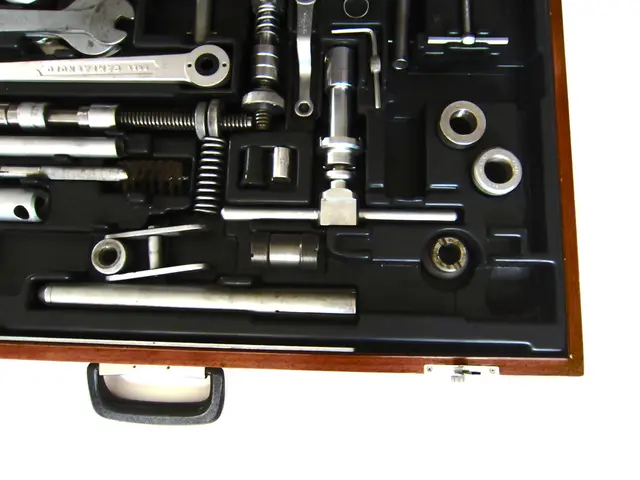Porsche at a critical juncture: the prominent automaker signs off on traditional vehicles, abandoning electric models
In the face of significant economic pressures and market challenges, German car manufacturers are modifying their electric vehicle (EV) strategies and continuing production of combustion engines.
Porsche, a subsidiary of Volkswagen, is one such company adjusting its E-car strategy. The automaker plans to invest "significantly" in combustion engines again, according to reports. This decision comes after Porsche reported a loss of 71 percent.
Similarly, Audi and BMW are also taking a cautious approach towards full electrification. Audi has abandoned the plan to stop building new cars with combustion engines from 2026, while BMW continues to produce combustion engine vehicles alongside electric and hybrid models.
The transition to electric cars is causing significant problems for car manufacturers. Economist Oliver Holtemueller thinks it is "increasingly unlikely" that a full transition to electric mobility in Europe will succeed within the originally planned timeframe. BMW CEO Oliver Zipse described the combustion engine phase-out as a "disaster". Auto expert Frank Schwope stated that the switch to electric cars is "tearing apart" the manufacturers.
The EU's planned 2035 combustion engine ban is facing growing criticism. Bosch deputy CEO Christian Fischer warned about "deep cuts in Europe" regarding the combustion engine ban. Porsche CEO Oliver Blume stated that combustion engines will play a strong role "well into the 2030s".
The supplier industry, which traditionally supported combustion engine technology, is also under severe pressure. This pressure is due to falling internal combustion engine (ICE) vehicle sales and slower-than-expected domestically electric vehicle adoption.
Local manufacturer Xiaomi in China has given Porsche strong competition with its SU7 model, which resembles the Porsche design but is offered at significantly better prices. The Porsche icon 911 will also get more combustion engine variants, with the SUV Cayenne being refreshed with combustion engine and hybrid variants until the 2030s.
The Porsche's weak half-year results were explained by decreasing demand for premium and luxury cars in China, Trump's auto tariffs, and the "sluggish transformation to electromobility". Despite the higher percentage of electric cars in Porsche sales compared to expectations, the overall market is smaller.
The ban on internal combustion engines is seen as economically unsound for achieving emission reduction targets. Porsche's decision to invest significantly in combustion engines again reflects this view, as does Mercedes' announcement of a new combustion engine offensive last year.
In summary, German automakers are not fully abandoning electric car plans but are responding to economic challenges, market uncertainties, and restructuring pressures by continuing combustion engine production where viable and moderating the pace of their EV transition around 2025. This approach helps maintain profitability and workforce stability amid a turbulent automotive market.
- The economic and social policy surrounding the transition to electric vehicles is facing criticism due to its potential impact on the industry.
- The finance sector is closely monitoring the transition, as it could significantly affect business and personal-finance strategies.
- Transportation is at a crossroads, with the shift towards electric vehicles causing problems for manufacturers.
- In the midst of this transition, lifestyle choices are evolving, as consumers consider the environmental impact of their automotive purchases.
- The automotive industry, including companies like Porsche, Audi, and BMW, are adjusting their electric vehicle strategies.
- Porsche, a subsidiary of Volkswagen, is planning to invest significantly in combustion engines again.
- Home-and-garden manufacturers might see a shift in demand due to potential cost savings from electric cars.
- As combustion engines continue to be produced, the business of banking and insurance could also be affected by related factors, such as fuel prices and vehicle depreciation.
- Gadget enthusiasts may find new opportunities in the next generation of smartphones, with advancements in battery technology for electric vehicles.
- Technology companies are expected to play a pivotal role in the electric vehicle revolution, from reducing reliance on fossil fuels to improving connectivity and autonomous driving features.
- Education-and-self-development opportunities might arise as people seek to learn about electric vehicles and their impact on the world.
- Personal-growth and career-development prospects in the electric vehicle industry may become increasingly attractive as the technology advances.
- Shoppers are likely to find a wider variety of electric vehicle options available in the coming years.
- Social-media platforms could see increased conversation about electric vehicles, policy changes, and the overall transition.
- For those interested in entertainment, sports events like NFL, MLB, NHL, NBA, racing, and golf could potentially incorporate electric vehicle sponsorships and integration.
- Policy-and-legislation surrounding transportation and emissions reductions is a hot topic in politics.
- General-news outlets are closely following updates on the electric vehicle transition and its implications for the economy.
- Crime-and-justice stories may emerge as there could be changes in the mechanisms and processes related to vehicle production, ownership, and maintenance.
- Accidents involving electric vehicles and their charging infrastructure could become more common and require learning about their unique safety considerations.
- The learning curve for the electric vehicle industry is steep, with new challenges arising in areas like battery technology, infrastructure, and consumer adoption.
- Sports like football, baseball, hockey, golf, basketball, and mixed-martial-arts could be impacted by the rise of electric vehicles in various ways.
- In certain regions, sports-betting markets may adjust to the electric vehicle transition when it comes to events like the Grand Prix or horse racing.
- Amid these changes, staying informed about weather conditions, sports analysis, and auto-racing news could become more important for those interested in the electric vehicle industry.






